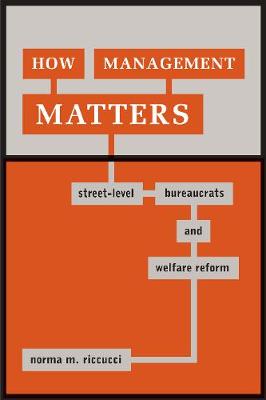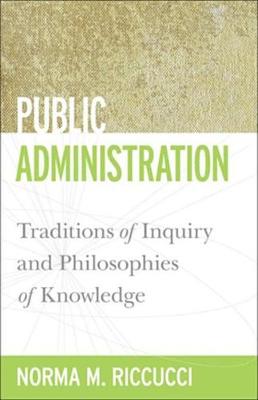Public Management and Change
2 total works
Both "bureaucracy" and "bureaucrats" have taken on a pejorative hue over the years, but does the problem lie with those on the "street-level" - those organizations and people the public deals with directly - or is it in how they are managed? Norma Riccucci knows that management matters, and she addresses a critical gap in the understanding of public policy by uniquely focusing on the effects of public management on street-level bureaucrats. How Management Matters examines not only how but where public management matters in government organizations. Looking at the 1996 welfare reform law (the Personal Responsibility and Work Opportunity Reconciliation Act, or PRWORA), Riccucci examines the law's effectiveness in changing the work functions and behaviors of street-level welfare workers from the role of simply determining eligibility of clients to actually helping their clients find work.
She investigates the significant role of these workers in the implementation of welfare reform, the role of public management in changing the system of welfare under the reform law, and management's impact on results - in this case ensuring the delivery of welfare benefits and services to eligible clients. Over a period of two years, Riccucci traveled specifically to eleven different cities and, from interviews and a large national survey, she gathered quantitative results from cities in such states as New York, Texas, Michigan, and Georgia, that were selected because of their range of policies, administrative structures, and political cultures. General welfare data for all fifty states is included in this rigorous analysis, demonstrating to all with an interest in any field of public administration or public policy that management does indeed matter.
She investigates the significant role of these workers in the implementation of welfare reform, the role of public management in changing the system of welfare under the reform law, and management's impact on results - in this case ensuring the delivery of welfare benefits and services to eligible clients. Over a period of two years, Riccucci traveled specifically to eleven different cities and, from interviews and a large national survey, she gathered quantitative results from cities in such states as New York, Texas, Michigan, and Georgia, that were selected because of their range of policies, administrative structures, and political cultures. General welfare data for all fifty states is included in this rigorous analysis, demonstrating to all with an interest in any field of public administration or public policy that management does indeed matter.
Is public administration an art or a science? This question of whether the field is driven by values or facts will never be definitively answered due to a lack of consensus among scholars. The resulting divide has produced many heated debates; however, in this pioneering volume, Norma Riccucci embraces the diversity of research methods rather than suggesting that there is one best way to conduct research in public administration.
Public Administration examines the intellectual origins and identity of the discipline of public administration, its diverse research traditions, and how public administration research is conducted today. The book's intended purpose is to engage reasonable-minded public administration scholars and professionals in a dialogue on the importance of heterogeneity in epistemic traditions, and to deepen the field's understanding and acceptance of its epistemological scope. This important book will provide a necessary overview of the discipline for graduate students and scholars.
Public Administration examines the intellectual origins and identity of the discipline of public administration, its diverse research traditions, and how public administration research is conducted today. The book's intended purpose is to engage reasonable-minded public administration scholars and professionals in a dialogue on the importance of heterogeneity in epistemic traditions, and to deepen the field's understanding and acceptance of its epistemological scope. This important book will provide a necessary overview of the discipline for graduate students and scholars.

